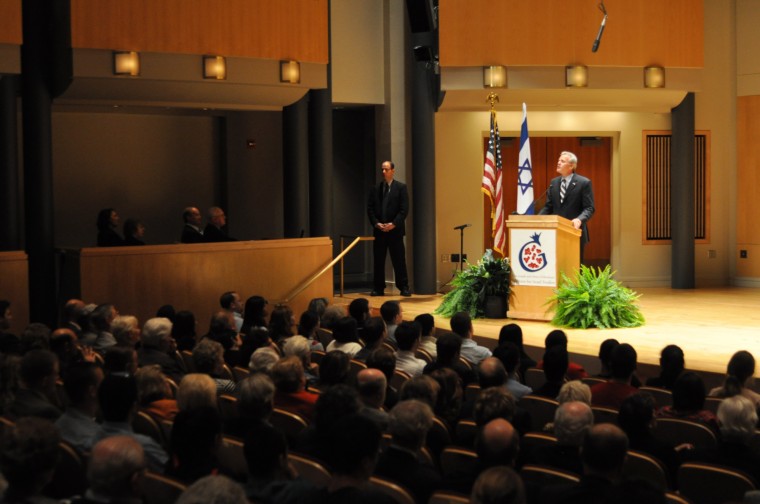
Michael Oren, the Israeli Ambassador to the U.S. speaks to a large crowd inside the performing arts center last night.
Israeli Ambassador to the U.S. Michael Oren’s first-ever appearance on the campus was quiet, but the tension was palpable.
Oren, the distinguished guest for the Gildenhorn Institute-sponsored event, discussed the importance of the U.S.-Israeli relationship in the campus’ third annual Richard and Elizabeth Dubin lecture series yesterday in the Clarice Smith Performing Arts Center.
In his speech, which was protested by about 20 students who stood outside the building holding pro-Palestine signs, Oren touched on how the United States’ relationship with Israel developed and why it is unique.
He said the partnership between the two countries began as a result of the two coalescing to combat terrorism, adding maintaining a strong relationship with the U.S. is vital to eventually negotiating peace between Israelis and Palestinians.
Although Oren was widely supported by what one guest called a largely pro-Israel audience, some expressed opposition. A demonstration that particpants called “The Silenced Perspective,” included the display of a large banner painted the colors of the Palestinian flag and sought to silently convey the group’s view that Palestinians living in Israel’s disputed territories are not given a voice.
About 20 students, many of whom are members of this university’s chapter of Students for Justice in Palestine, stood holding signs that read, “Why support suffering?” and “What we want: Justice for All.”
“We’ve been making our signs speak for themselves,” said SJP president Natalia Cuadra-Saez, who along with the 20-some protesters wore tape over her mouth as a symbol of voicelessness. “I want our message to be unified and clear and avoid being muddled by arguments.”
Inside CSPAC’s lobby, a handful of American University students from that university’s chapter of SJP protested by wearing Palestinian colors and spoke to students heading into the main event.
But even the silent protest did not remain quiet for long.
Some driving by threw objects at the protesters, students walking into CSPAC made disparaging remarks, and inside, heated debates broke out. Some Oren supporters said the demonstrations were unnecessary, saying the issues the protesters were invoking were hardly touched upon in the ambassador’s speech.
“I was handed a flier about monetary aid the U.S. gives Israel,” said junior government and politics major Traci Siegal, treasurer of the Terrapin Israeli Public Affairs Committee. “Oren didn’t really talk about monetary aid.”
Even that flier, the protesters said, was not universally well-received. SJP Vice President Samira Farah said an adult ripped it up after reading it and handed the pieces to the students assembled outside.
Director of the Gildenhorn Institute for Israel Studies Yoram Peri said despite the passions the issue often raises, Oren was asked to speak as a part of the series because of his academic background.
“Oren is a historian and has studied U.S.-Israel relations,” he said. “It’s easier to bring an ambassador who himself is an academic and understands the academic atmosphere.”
Siegal said this wasn’t her first time attending one of Oren’s lectures.
“He was devoted at such a young age to serve his country,” she said. “He gets me every time. He’s just a phenomenal person.”
As guests exited the hall, protesters’ tactics changed: They took turns shouting names of Palestinians followed by their ages — most were under 18 — and repeating the phrase, “These are the names of civilian victims of Israeli military attacks.”
“You guys ought to learn the history,” one man said as he passed the group.
Program Coordinator for the Gildenhorn Institute Jennifer Cornejo said protests about this issue often go off-topic, but noted the heightened security at the event made her feel comfortable.
“We definitely support free speech,” she said. “But we don’t want any disruption or chaos.”
President of Terrapin Students for Israel Noam Weinblatt described Oren’s message as “interesting” and “a great showing,” adding Oren’s views went hand-in-hand with that of his group, a bi-partisan group that advocates for Israel and holds educational events on the campus.
“[Oren] definitely correlates with our values; we believe 100 percent in dialogue,” he said, adding that Oren stressed the importance of discussion. “Our organization is very pro-Israel, but it’s not anti-Palestinian.”
Freshman Rachel Waldman agreed, saying she admired the way Oren handled some challenging questions.
“He answered everyone’s questions really well,” she said. “He kept Israel in a good light.”
Former guests of the Dubin lecture series included former Israeli Ambassador Danny Ayalon and Washington Post reporter David Ignatius. Peri described plans to create a student council for the institute, which will give students the opportunity to be engaged with activities like the Dubin series.
“We want students to have a broad knowledge of Israel today in all aspects,” he said.
elbasha at umdbk dot com



